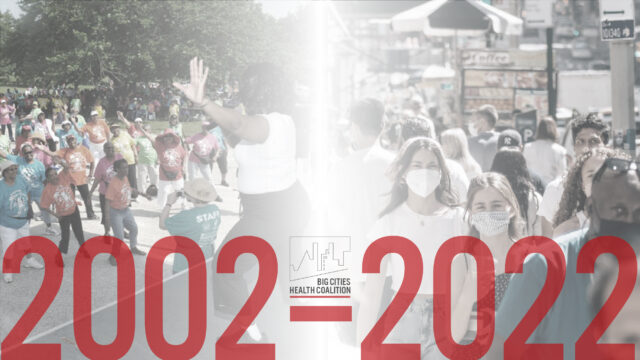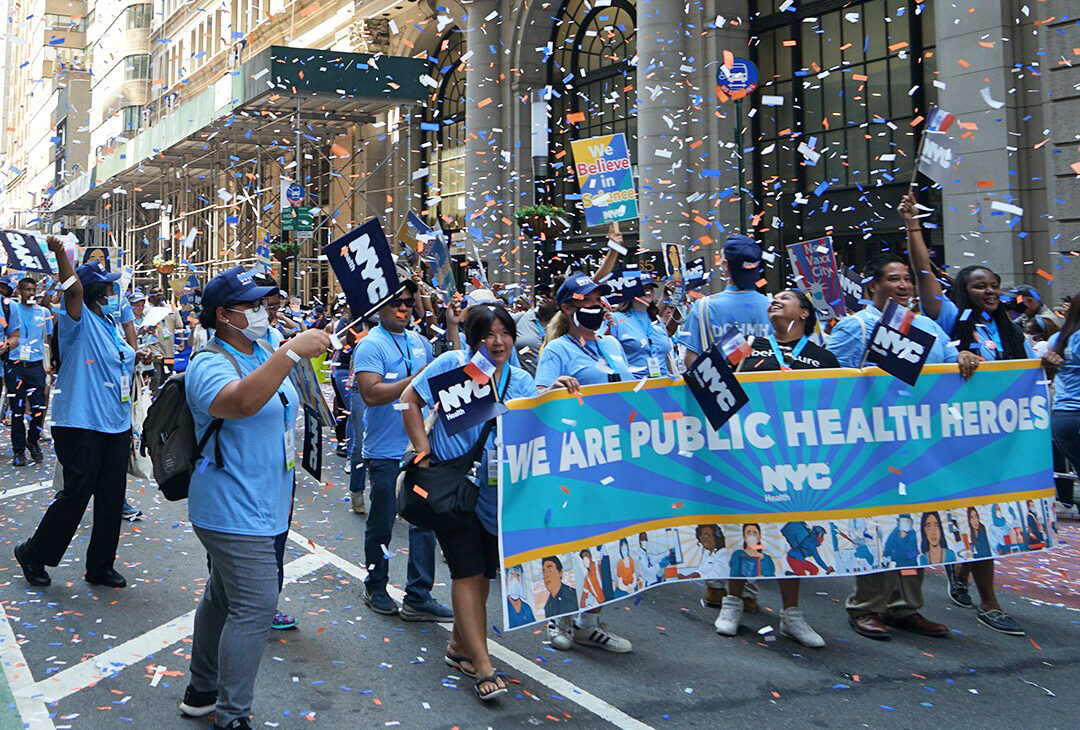Frontline Blog
20 years of BCHC
July 2022

As Big Cities Health Coalition celebrates its 20th anniversary, we look back on two decades of urban public health milestones. Again and again, big cities lead the charge to innovate in public health.
2001
PHEP Cooperative Agreement created at CDC
The Public Health Emergency Preparedness (PHEP) cooperative agreement provides critical funding to state, local, and territorial public health departments to be able to respond nimbly to public health threats such as infectious diseases, natural disasters, and biological, chemical, nuclear, and radiological events. PHEP remains one of the few, but growing, federal public health funding streams that goes directly to big cities.
2002
BCHC founded
The Coalition was founded by Dr. Thomas Frieden (then Commissioner of the New York City Department of Health and Mental Hygiene) and Dr. Jonathan Fielding (then Director of Public Health and the Health Officer at the Los Angeles County Department of Public Health). BCHC was created to provide big city public health leaders with a core network of peers facing similar challenges and experiences and to collaborate on policy and practice innovation happening in the nation’s largest cities.
2003
SARS reaches U.S.
Severe Acute Respiratory Syndrome (SARS), an atypical type of pneumonia, first appeared in China in 2002. We now know it is caused by a coronavirus (SARS-CoV). Globally, 8,098 people contract the virus (just eight known cases in the U.S.), and 774 die.
2005
Hurricane Katrina
One of the most devastating natural disasters in U.S. history, Hurricane Katrina killed more than 1,800 people and displaced another 600,000 along the Gulf Coast. The hurricane’s impact revealed deep problems that are at the heart of many natural and public health disasters: (1) death and displacement disproportionately affected people of color; and (2) the response was challenged by slow movement from federal officials and unclear communication about who had jurisdictional authority.
2006
HPV vaccine approved
FDA approves a vaccine for human papillomavirus (HPV) to prevent cervical cancer.
E-cigs appear on U.S. market
Though the earliest e-cigarette patent dates to 1930, the first commercially successful e-cig is developed in China and enters the U.S. market in August 2006.
2008
WHO Commission on Social Determinants of Health
Formed in 2005, the commission releases its final report in 2008, documenting appalling levels of health inequity globally.
2009
H1N1 pandemic
According to the CDC, influenza vaccination and other public health measures at the time prevent 5–10 million cases, 30,000 hospitalizations, and 1,500 deaths.
Family Smoking Prevention and Tobacco Control Act (TCA)
Congress passes the TCA, giving FDA authority to regulate tobacco. The act bans most types of flavored cigarettes, but exempts menthol, which is primarily marketed to Black tobacco users, as well as the LGBTQ+ community.
2010
Affordable Care Act (ACA)
The ACA creates the Prevention and Public Health Fund, meant to support prevention activities as a non-clinical complement to health insurance and health care.
2012
Sandy Hook Elementary School shooting
The mass shooting of 20 six- and seven-year-olds and six teachers in Newtown, CT, galvanizes many behind the idea that gun violence is a public health issue.
Pre-Exposure Prophylaxis (PrEP) for HIV
FDA approves use of pre-exposure prophylaxis (PrEP) for human immunodeficiency virus (HIV), in combination with safe sex practices, to reduce the risk of sexually acquired HIV-1 infection in at-risk adults, and later in 2018 for adolescents.
2014
BCHC develops a more formal membership organization
BCHC moves to the National Association of County and City Health Officials (NACCHO) and hires 2.5 FTEs to support the growing work and needs of the Coalition. Eighteen members are part of BCHC.
First PH WINS survey
The de Beaumont Foundation and Association of State and Territorial Health Officials (ASTHO) field the first Public Health Workforce Interests and Needs Survey (PH WINS), the first and only nationally representative source of data about the governmental public health workforce. The survey was fielded again in 2017 and 2021, with BCHC-specific sample results to analyze workforce trends.
2015
BCHC holds its first formal membership retreat
At this retreat, BCHC commissioners affirm a shared vision, dues, and membership and leadership structure for the Coalition’s work together. They approve annual dues and the expansion of BCHC to 28 cities.
Paris Climate Accords adopted
This international treaty marks a critical stage in the United States’ recognition of climate change as a global crisis—and as a public health issue.
Big Cities Health Inventory dashboard launches
With funding from CDC, BCHC launches an open-access data platform to provide rare city-level data on public health and social determinants of health. In 2020, and in partnership with Drexel University’s Urban Health Collective, the database relaunches and expands to more than 100,000 data points across more than 100 health, socioeconomic, built environment, and demographic metrics with data from all 35 member cities.
BCHC highlights emergency preparedness at congressional briefing
BCHC hosts a congressional briefing to stress the importance of federal funding to support emergency public health preparedness in big cities. Members share lessons learned from Ebola and other emergencies.
BCHC produces measles vaccine PSA
With measles cases on the rise for the first time in decades, BCHC works with members to film a public service announcement urging parents to vaccinate their children. The PSA is customizable for use in different jurisdictions.
2016
BCHC holds Tobacco 21 briefing to support federal legislation
BCHC, Trinity Health, and the Campaign for Tobacco-Free Kids host a congressional briefing to support passage of “Tobacco 21” to raise the federal legal age to purchase tobacco from 18 to 21. Prior to this, big cities such as New York City, Chicago, Boston, Cleveland, and Kansas City had already passed their own local Tobacco 21 laws.
2017
U.S. declares opioid epidemic a public health emergency
For years, big city health departments have been on the frontlines of the opioid epidemic, instituting innovative strategies and urging the federal government to provide funding and policy support. By 2017, overdose deaths from opioids far surpass that from any other class of drugs. Opioid misuse also contributes to increases in non-fatal overdoses, neonatal abstinence syndrome, and the spread of infectious diseases such as HIV and hepatitis C.
2018
BCHC partners with CSTE on first-ever big city epidemiology capacity assessment
BCHC and the Council of State and Territorial Epidemiologists release their first study of the big city epidemiological workforce, which finds higher epi per capacity than states, but mostly supported with local rather than federal dollars. BCHC and CSTE continue to collaborate, including on a 2021 epi capacity assessment.
2019
BCHC holds briefing on measles outbreaks, covered by C-SPAN
BCHC members from New York City and L.A. County share first-hand experiences of responding to measles outbreaks, while at the same time preventing additional spread of the disease. C-SPAN airs the briefing.
Tobacco 21 passes
The Federal Food, Drug, and Cosmetic Act is amended to make it illegal for retailers to sell tobacco products to anyone under 21.
2020
COVID-19 pandemic begins
The deadliest disease in U.S. history requires a broad-spectrum public health response, including mass vaccination events, development of quarantine and social distancing protocols, testing, contact tracing, and public education. Big cities take the earliest and hardest hits from COVID-19, and the effort to mitigate its effects puts severe strain on the already stretched resources of local public health departments. (View the BCHC/ASTHO mask PSA.)
Racial Justice Reckoning of 2020
The murder of George Floyd by Minneapolis police, COVID-19 racial disparities, and the structural inequities at the root of these tragedies inspire a worldwide reckoning with systemic racism and the racist roots of U.S. laws, policies, and institutions.
2022
BCHC expands to 35 members
After revising membership criteria to include cities with a population of 500,000 people or more, six new jurisdictions join the coalition: El Paso, Louisville, Memphis (Shelby Co.), Milwaukee, Oklahoma City, and Tucson (Pima Co.).
BCHC unveils its Urban Health Agenda
The Coalition releases a vision for making health and equity a reality. The vision includes government agencies (not just health departments) and community-based organizations collaborating to promote health and safety, in part through dismantling structural inequities and systems built on generations of racism.

Report